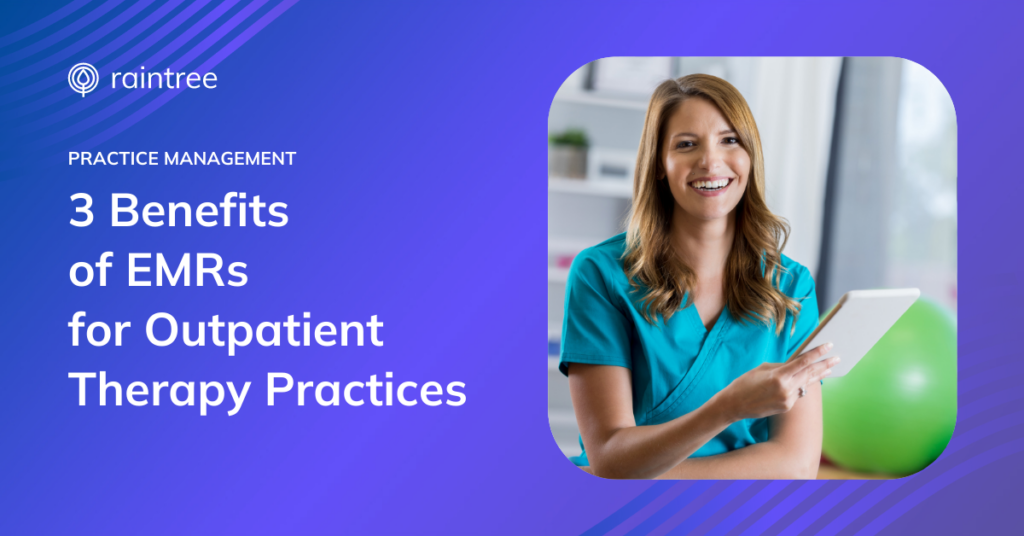With nearly 90% of office-based healthcare practices adopting electronic medical records (EMR), the EMR market has expanded exponentially! This expansion has led to the development of specialized software for various healthcare settings and fields of study, including several EMRs for outpatient therapy.
By understanding the key differences between inpatient electronic health records (EHR) and outpatient electronic medical records, therapy and rehab practices can be more informed about the ways that modern tools can meet their specialized needs. From streamlining documentation to providing key business intelligence insights, here are three benefits of EMRs designed for outpatient therapy practices.
What Type Of EMR Software Do Therapy And Rehab Practices Need?
Inpatient EHRs are software solutions designed with large hospital systems in mind – more specifically, they target the major pain points of operating a healthcare facility that has many departments, specialties, and systems that work independently, but need to communicate with each other. The solution here is simple: hospitals benefit immensely from standardized clinical documentation that is both interoperable and transferable between departments – which just so happens to be a critical feature of an inpatient EHR.
While cookie-cutter templates are undeniably useful for large-scale hospitals, the standardized medical records produced at a hospital may not include all of the details that a therapist at an outpatient facility would need in order to get a full picture of the patient’s health. That’s where outpatient EMRs come in.
Outpatient EMRs, sometimes referred to as ambulatory electronic health records (AHR/EHR), are designed to work with smaller practices and are typically much more streamlined than the EHRs used in hospitals. Therapists that utilize an outpatient EMR benefit from patient records that allow for more comprehensive documentation capabilities, which is ideal for identifying health trends, recording medical history, facilitating diagnosis, providing long-term care, and more.
The Benefits of Specialized EMRs for Outpatient Therapy
While there are many moving pieces to operating either a giant healthcare practice or a smaller therapy clinic, both depend on efficiency to operate successfully. From improved productivity to increased overhead to more accurate diagnoses, efficiency can not only provide quality care to more patients but positively impact revenue as well.
So where should therapists start?
1. Integrated Practice Management Starts With Clinical Documentation
By utilizing pre-built templates designed for outpatient therapy and rehabilitation, therapists and their office personnel can start delivering quality patient experiences right away. Furthermore, templates that allow for further customization can enable therapists to create documentation that is perfectly tailored to their needs. In fact, true efficiency for therapy clinics begins with optimized clinical documentation made available through outpatient EMRs.
On the other hand, the documentation created for inpatient therapy software is bound by the need to keep medical records easy to transfer between departments, which ultimately calls for a more generic method of documentation that can be applied across multiple therapy specialties.
2. Optimize Your Therapy EMR Solution With Automation
When paired with clinical documentation, automated workflows can dramatically improve the productivity of any hospital or outpatient practice. Examples of processes that are commonly automated include:
- Insurance verification and eligibility checks
- Revenue cycle management and therapy billing
- Patient appointment reminders or post-visit follow-ups
However, not all automation is created equal! This is where the differences between inpatient and outpatient EMRs can be seen more clearly. Inpatient medical record systems are composed of several departments that are interoperable, but still separate entities. For example, the automated processes that benefit the radiology department may do nothing for the automation needs of the billing department, and vice versa.
Since outpatient EMRs are built on a smaller scale from the get-go, automation for revenue cycle management, patient engagement, and other unique therapy EMR functionalities, all can be easily implemented without needing to juggle interoperability between large departments.
3. Future-Proof Your Therapy Practice With Flexible Business Intelligence
While a scalable outpatient EMR with high-level business intelligence tools can tackle the needs of both a massive hospital organization or a rehab therapy practice, it’s more common for a hospital to choose an inpatient EHR system that can handle the intricacies of transferable data. Similarly, therapy and rehab practices often opt for the streamlined business intelligence tools offered by outpatient EMR systems that enable therapists to:
- Track data over longer periods of time
- Identify trends and gain insights into patient progress
- Track and analyze staff key performance indicators (KPI)
- Plus, so much more…
So with the help of predictive business analytics, outpatient EMRs can recognize symptoms and patterns that can lead to faster, more accurate diagnoses that may be otherwise missed in a short-term hospital stay!
Physical Therapy Software: An EMR Designed For Your Specialty
With the outpatient healthcare market predicted to reach $6.6 billion by 2027, there’s no better time to start using the best therapy EMR that is both powerful and flexible!
Unlike other software companies, Raintree offers a comprehensive EMR and practice management solution designed to tackle the unique challenges of operating a successful therapy practice. From customizable clinical documentation and streamlined workflows to automated therapy billing and interactive reporting, our all-in-one software system is dedicated to helping you deliver more efficient care and facilitate engaging patient experiences.
With embedded telehealth options, a simple and secure portal, automated messaging capabilities, and more, Raintree’s Connect patient engagement platform can also improve outcomes, boost practice revenue, as well as foster authentic relationships with your patients in addition to empowering your staff.
Whether it’s physical therapy, occupational therapy, speech therapy, or applied behavioral analysis, if you’re interested in the full scope of Raintree’s EMR capabilities – schedule a free demo or discovery call today!


